Over 80% of company employees say AI needed to deal with labor shortages
Dentsu Inc. (President & CEO: Takeshi Sano; Head Office: Tokyo) today announced the results of its third AI Consumer Awareness Survey of 3,000 male and female respondents between the ages of 15 and 69, of whom 1,035 are currently employed in small, medium, or large enterprises.1 The poll, held nationwide from July 18 to 22, 2024, was conducted by AI MIRAI, an interdivisional organization of the Dentsu Group companies in Japan that oversees projects involving AI.
The survey was conducted to determine various issues and trends related to AI, including the current level of awareness and utilization of AI in Japan, as well as consumers' expectations for and concerns over AI. The survey aims to contribute to people's understanding of AI, the growth of related businesses, and industrial development in general.
Key findings of the survey are presented below.
Key Findings2
1.33.4% of all 3,000 survey respondents are users of AI services, with those aged 15 to 19 reporting the highest usage rates among all age groups. Use was highest among teenage boys at 58.9%.
2.35.9% of the 3,000 respondents chose the answer "Fake news and misinformation will spread throughout society due to AI" as their top concern about AI, followed by 31.6% for "Information generated by AI could include false information (such as altered images like deep fakes)," and 28.3% for "I am not sure that AI can be used constructively."
3.Almost 30% of the 370 respondents working at companies employing over 500 people reported that their employers are using generative AI, and over 40% of these respondents indicated that the enterprises are either already using, or considering using, generative AI.
4.80.8% of the 1,035 company employees surveyed indicated the need for their companies to start using AI to address labor shortages. Compared with the results of the previous survey (November 2023), more of these respondents want to start using AI to deal with labor shortages, reduce costs, and create business opportunities. The increases were especially high among respondents who want to start using AI within six months.
5.The 1,035 company employees surveyed identified common issues faced by their workplaces before and after adopting AI services, including high operating and startup costs, the need for employee education and training, and the need for personnel with specialized knowledge and skills.
Notes:
1.The survey results include responses from company owners, executives, managers, and other employees.
2.The survey results do not always add up to 100% because they have been rounded to the first decimal place.
Details of Findings
1.33.4% of all 3,000 survey respondents are users of AI services, with those aged 15 to 19 reporting the highest usage rates among all age groups. Use was highest among teenage boys at 58.9%.
- 33.4% of all survey respondents use AI services either actively or when needed. (See Chart 1.)
- By age group, AI services were most commonly used by respondents aged 15 to 19, with usage rates of 58.9% and 43.6% among males and females, respectively. Compared to the results of the previous survey (November 2023), usage increased 7.6 percentage points among women in their 40s (from 20.7% to 28.3%) and 5.4% percentage points among men in their 60s (from 29.9% to 35.3%).
In contrast, usage decreased 17.8 percentage points among girls aged 15 to 19 (from 61.4% to 43.6%) and 10.0 percentage points among men in their 30s (from 40.9% to 30.9%). (See Charts 2 and 3.)
Chart 1.
Responses to the question, "Which of the following answers best reflects how much you use AI services? (If you use more than one AI service, please base your response on the service you use most.)"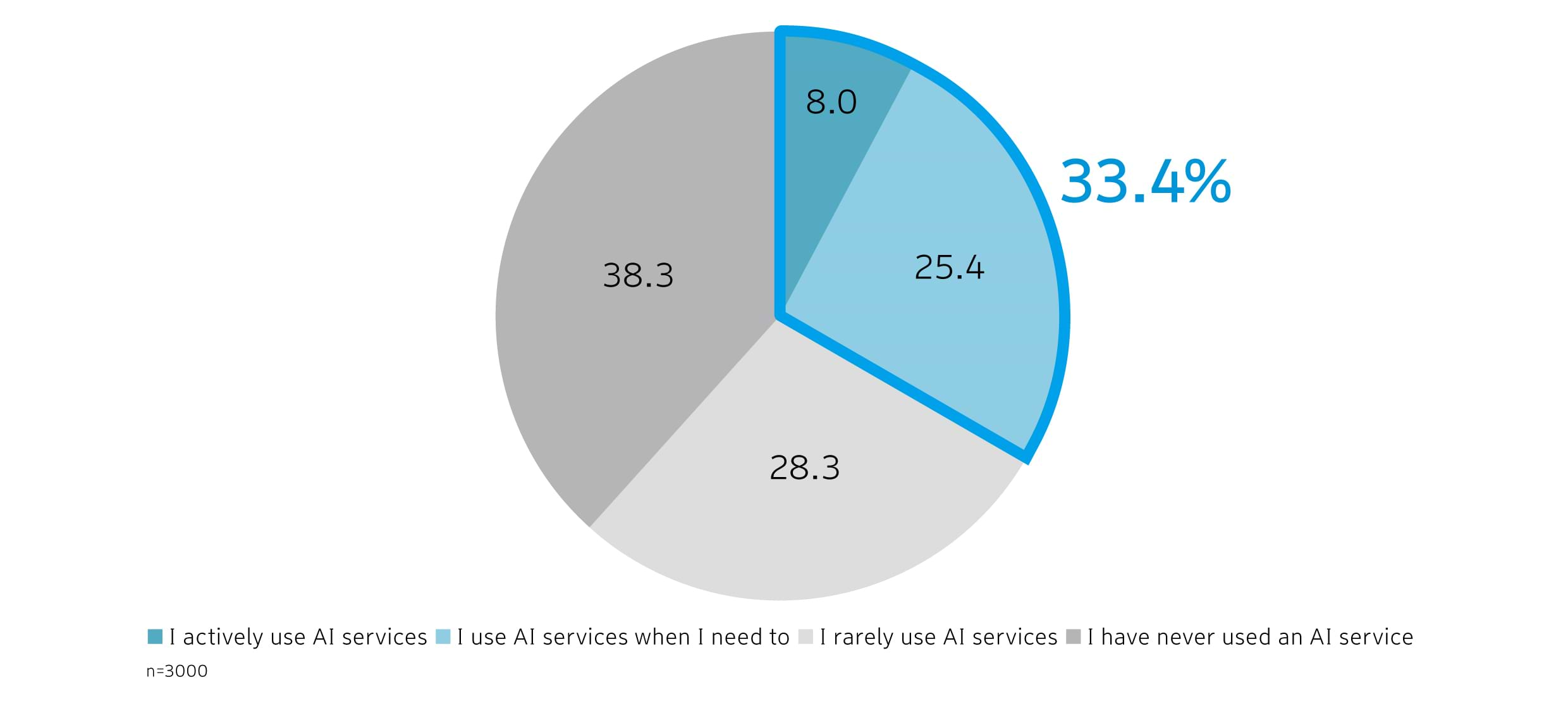
Chart 2.
Responses--by males from among the 3,000 respondents, by age group--to the question, "Which of the following answers best reflects how much you use AI services? (If you use more than one AI service, please base your response on the service you use most.)"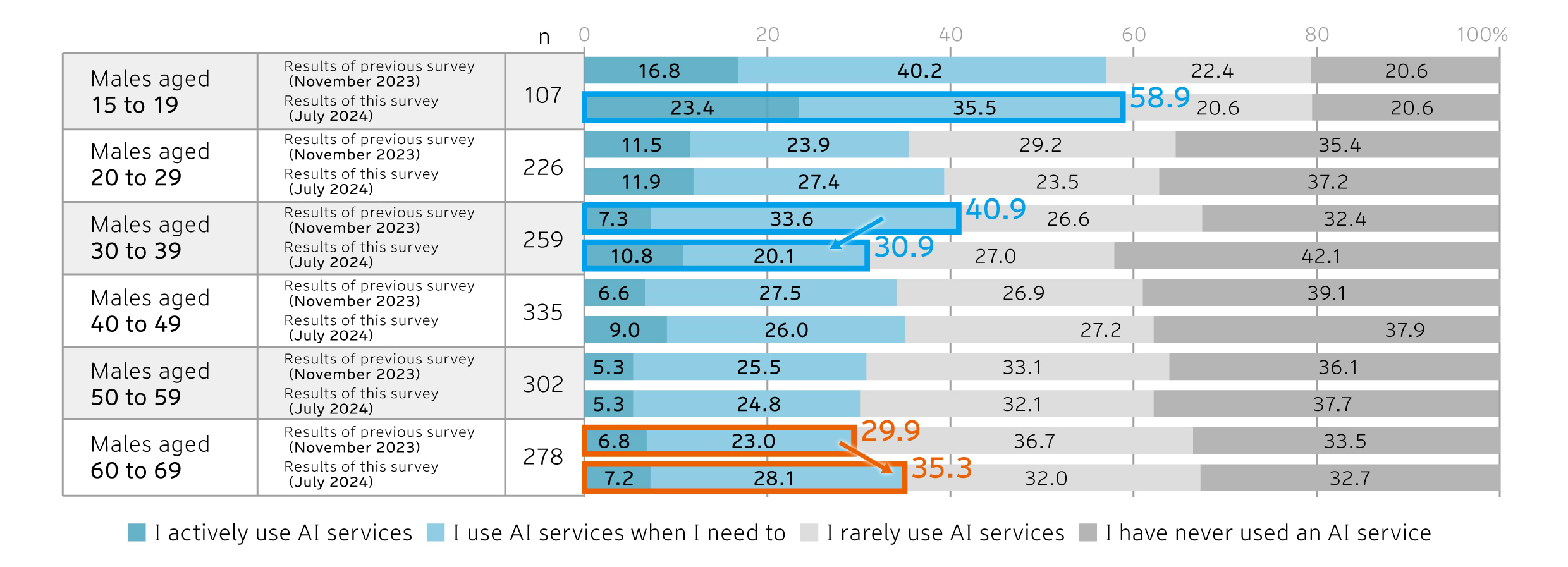
Chart 3.
Responses--by females from among the 3,000 respondents, by age group--to the question, "Which of the following answers best reflects how much you use AI services? (If you use more than one AI service, please base your response on the service you use most.)"
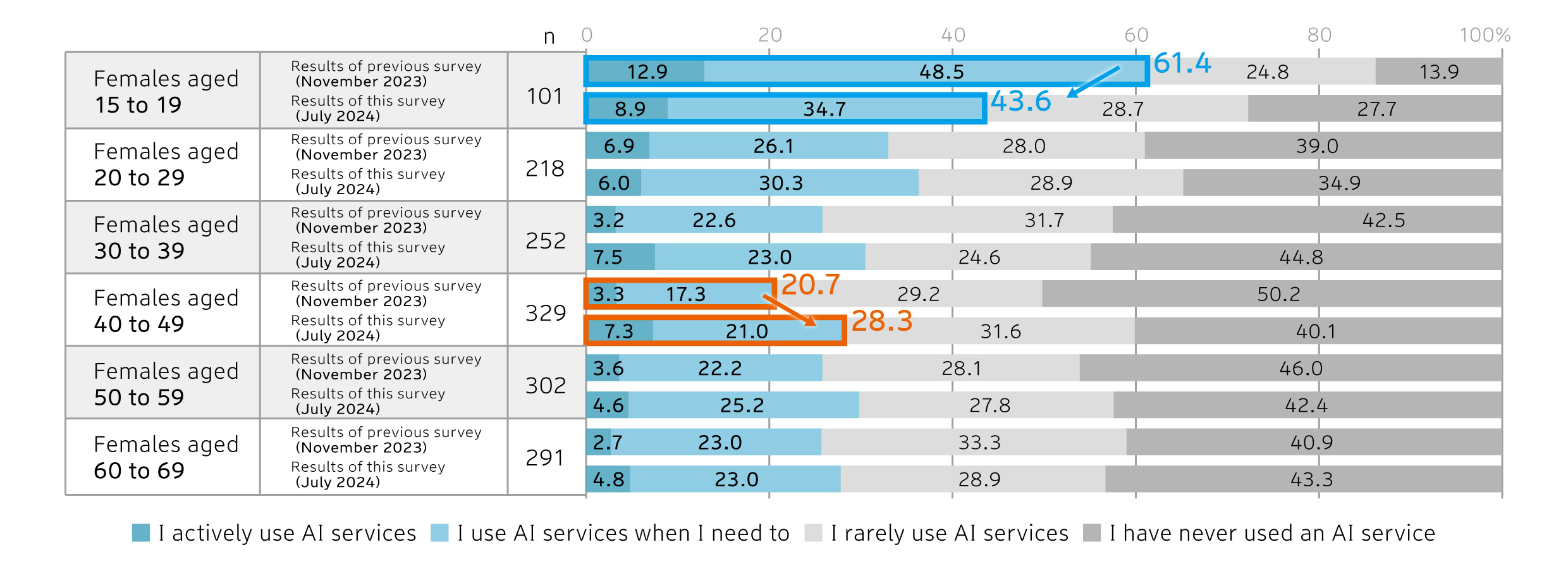
2.35.9% of the 3,000 respondents chose the answer "Fake news and misinformation will spread throughout society due to AI" as their top concern about AI, followed by 31.6% for "Information generated by AI could include false information (such as altered images like deep fakes)," and 28.3% for "I am not sure that AI can be used constructively."
- When asked about their concerns over AI, 35.9% of respondents chose the answer "Fake news and misinformation will spread throughout society due to AI," followed by 31.6% for "Information generated by AI could include false information (such as altered images like deep fakes)" and 28.3% for "I am not sure that AI can be used constructively."
Compared with the results of the previous survey (November 2023), respondents who chose the answer "AI could imitate the works of popular illustrators, musicians, and other creators, thereby reducing their originality" increased 3.9 percentage points (from 13.2% to 17.1%). Likewise, respondents who chose the answer "AI could infringe on copyrights of works that I have produced, such as pictures, illustrations, writing, or music" increased 3.9 percentage points (from 10.8% to 14.7%). Respondents who chose "Fake news and misinformation will spread throughout society due to AI" increased 3.5 percentage points (from 32.4% to 35.9%). (See Chart 4.)
Chart 4.
Responses to the question, "Given recent incidents and news reports about AI that you have seen or heard, which of the following answers reflect your concerns about AI? (Multiple answers acceptable.)
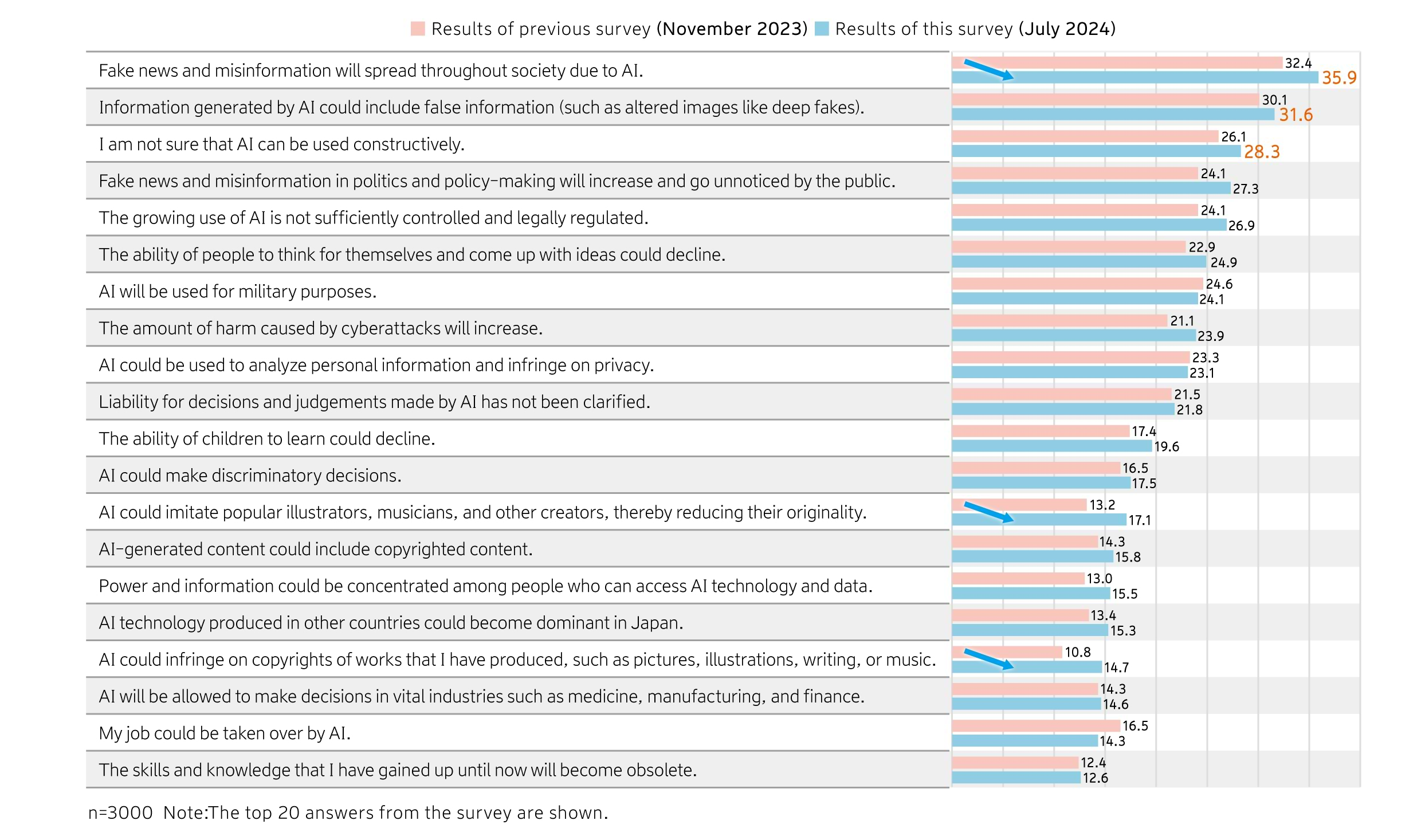
3.Almost 30% of the 370 respondents working at companies employing over 500 people reported that their employers are using generative AI, and over 40% of these respondents indicated that the enterprises are either already using, or considering using, generative AI.
- Among 1,035 survey respondents who are company employees, 18.7% indicated that generative AI is being used either "throughout the entire company" or "in some sections of the company" where they work.
Another 10.6% of respondents chose the answer "Generative AI is not used in the company, but its deployment in operations is currently being considered," suggesting that almost 30% of all company employees are either using or considering using generative AI.
This was the case for 43.6% of respondents working at companies employing between 500 and 999 people, with 28.7% of them indicating their companies are already using generative AI.
It was also the case for 43.5% of respondents at companies employing 1,000 or more people, with 29.7% of them indicating their companies are already using generative AI. (See Chart 5.)
Chart 5.
Responses to the question, "Which of the following answers best reflects how much generative AI is currently being used by the company you work for?"
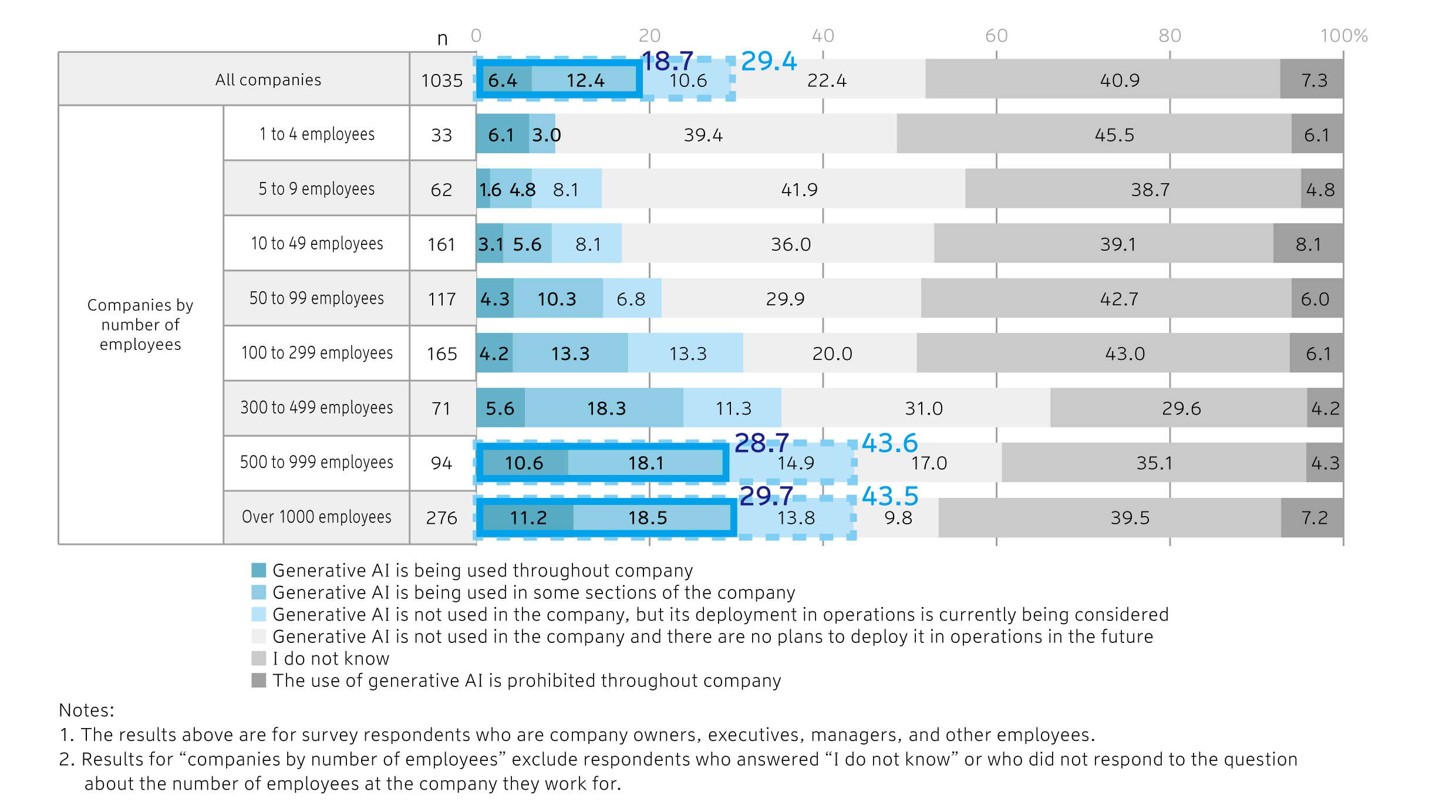
4.80.8% of the 1,035 company employees surveyed indicated the need for their companies to start using AI to address labor shortages. Compared with the results of the previous survey (November 2023), more of these respondents want to start using AI to deal with labor shortages, reduce costs, and create business opportunities. The increases were especially high among respondents who want to start using AI within six months.
- Compared with the results of the previous survey (November 2023), a higher percentage of survey respondents who are company employees indicated that it would be better for their company to start using AI (from "immediately" to "In more than three years' time") to help deal with labor shortages, reduce costs, and create business opportunities, respectively.
Specifically, 80.8% of these respondents chose the answer "Start using AI to help deal with labor shortages" (up 7.0 percentage points from 73.8%), while 79.2% chose "Start using AI to reduce costs" (up 7.0 percentage points from 72.2%). Some 76.5% of the respondents chose "Start using AI to create business opportunities" (up 7.5 percentage points from 69.0%).
These increases were particularly high among respondents who indicated that AI should be adopted within six months (all answers from "immediately" to "within six months"). Those choosing "Start using AI to help deal with labor shortages" rose 9.4 percentage points (from 32.2% to 41.6%), "Start using AI to reduce costs" increased 10.7 percentage points (from 30.2% to 40.9%), and "Start using AI to create business opportunities" jumped 11.1 percentage points (from 26.3% to 37.4%).(See Chart 6.)
Chart 6.
Responses to the question, "Which of the following answers best reflects your view on when your company should start using AI in the future for the purposes listed below? (Please respond based on your own view rather than the policy of the company you work for)."
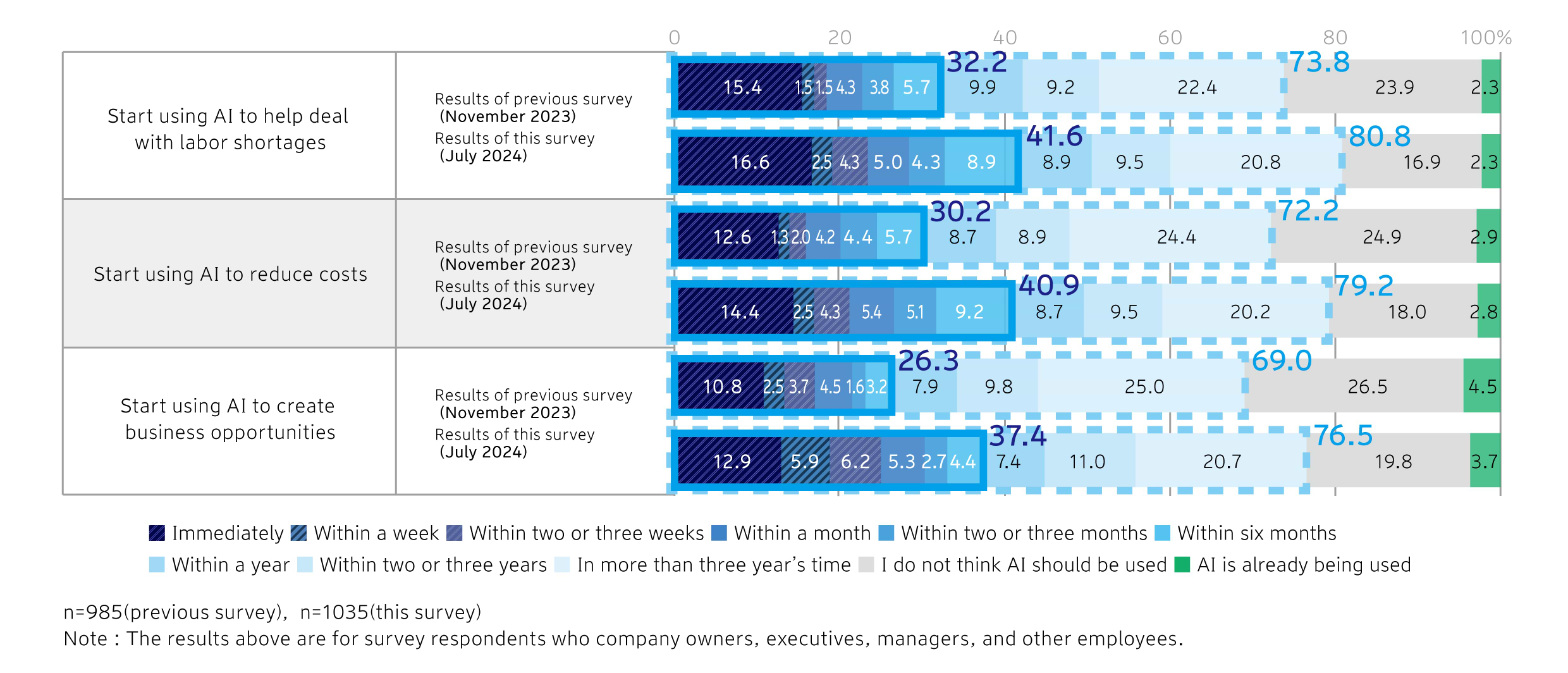
5.The 1,035 company employees surveyed identified common issues faced by their workplaces before and after adopting AI services, including high operating and startup costs, the need for employee education and training, and the need for personnel with specialized knowledge and skills.
- When asked about what issues their company dealt with when considering starting to use AI services, 14.3% of company employees surveyed chose the answer "Operating costs were too high," followed by 13.6% for "Startup costs were too high," 11.6% for "How to start up and operate the services was unclear," 11.2% for "Employee education and training was needed to start up and operate the services," and 10.0% for "Personnel with specialized knowledge and skills were needed to start up and operate the services."
Similarly, when asked about the issues their company faced after the AI services commenced, 9.8% of these respondents chose the answer "Operating costs were too high," followed by 9.4% for "Startup costs were too high," 7.7% for "Employee education and training was needed to start up and operate the services," and 7.5% for "Personnel with specialized knowledge and skills were needed to start up and operate the services." Finally, 7.2% of these respondents answered, "There were no obstacles or issues." (See Chart 7.)
Chart 7.
Responses to the question, "If the company you work for uses AI services, which of the following answers best reflects the issues it dealt with when considering starting to use the services, and the issues it faced after the services commenced? (Multiple answers acceptable.)"

Comments from the AI MIRAI
Through this survey, we found that over 30% of respondents are using AI services, and their use has been growing particularly among women in their 40s and men in their 60s compared with other groups. Consumers had more opportunities to learn about and try using generative AI in 2023, thus a wider range of people were using it in 2024.
Surprisingly, however, comparing the results of this survey with those of the previous one in 2023, we found that the use of AI services had declined among girls aged 15 to 19, who tend to be inquisitive about such trends, and men in their 30s, who are often exposed to AI in work settings.
This suggests that, although many members of these groups had tried using AI services in 2023 when AI was trending, they had felt that the services were not immediately useful at work or in daily life. Thus they had ceased using them.
The survey also suggests that consumers are paying attention to both the benefits of AI as well as its negative aspects, given their concerns about misinformation, fake news, and rights infringement.
Nevertheless, we found an increase in survey respondents employed by companies that are thinking about using AI, indicating that various companies have begun to seriously consider how to adopt AI. As this trend becomes more widespread, people will benefit from using AI in all kinds of settings, but problems stemming from its use could also increase, so regulations for dealing with such problems must be put in place as soon as possible.
Survey Overview
Objectives:
・To determine various issues and trends related to AI, including the current level of awareness and utilization of AI among users in Japan, and their related expectations and concerns.
・To contribute to people's understanding of AI, the growth of related businesses, and industrial development in general.
Sample Area: Nationwide in Japan
Target Sample: Male and female respondents between the ages of 15 and 69
Sample Size: 3,000 respondents (weighted to reflect the composition of Japan's population), comprising 208 male and female respondents aged 15 to 19, and 2,792 male and female respondents aged 20 to 69 divided into 10-year age groups.
Survey Method: Internet-based survey
Survey Period: From July 18 to 22, 2024
Survey Institution: Dentsu Macromill Insight, Inc.
About AI MIRAI
Established in 2018, AI MIRAI is an interdivisional project team comprising members of the Dentsu Group companies in Japan. Bringing together networks of people from both in and outside this group and their advanced expertise, AI MIRAI leverages these networks and applies ideas and insights into society and consumers that are unique to advertising companies in the emerging field of AI. It works to devise solutions facing society today by integrating marketing concepts in technologies and applying AI and machine-learning technologies.
==================================================
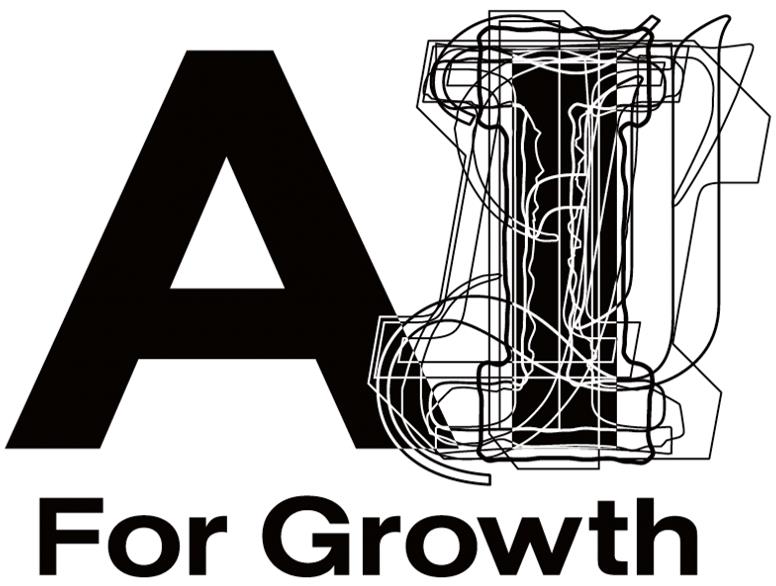
The AI Consumer Awareness Survey is conducted in line with the strategic vision of Dentsu Group companies in Japan. The vision, entitled AI for Growth, aims to contribute to the growth of corporate clients and society as a whole by combining human and artificial intelligence.
For more information about AI for Growth, please refer to the following news release (Japanese language only):
https://www.dentsu.co.jp/news/release/2024/0805-010762.html
==================================================
#####
Contact
Media-related inquiries:
Branding Office, Dentsu Corporate One Inc.
Email: global.communications@dentsu.co.jp
Survey-related inquiries:
AI MIRAI Survey Team, Dentsu Inc.
Email: ai-investigation@dentsu.co.jp
